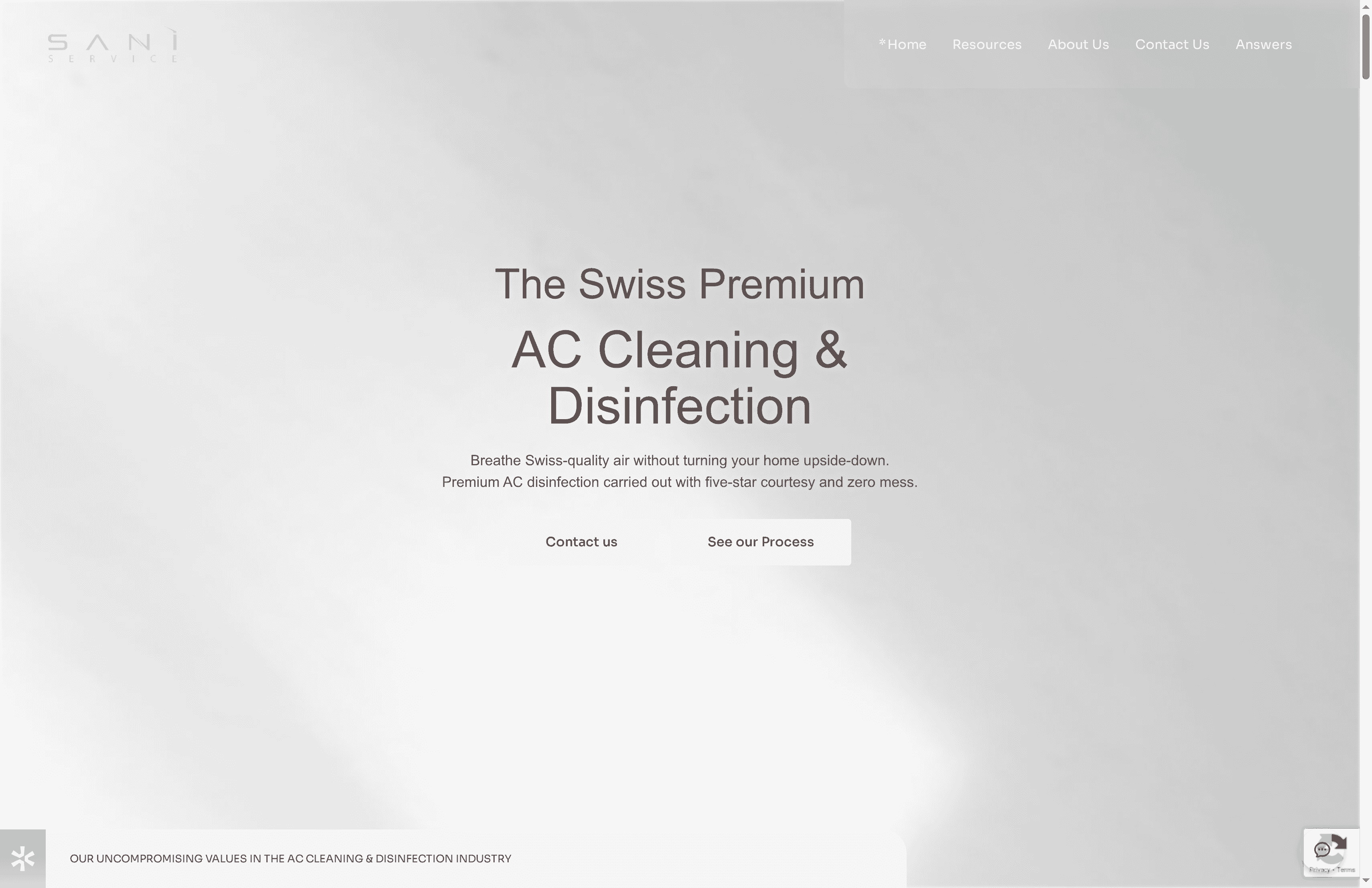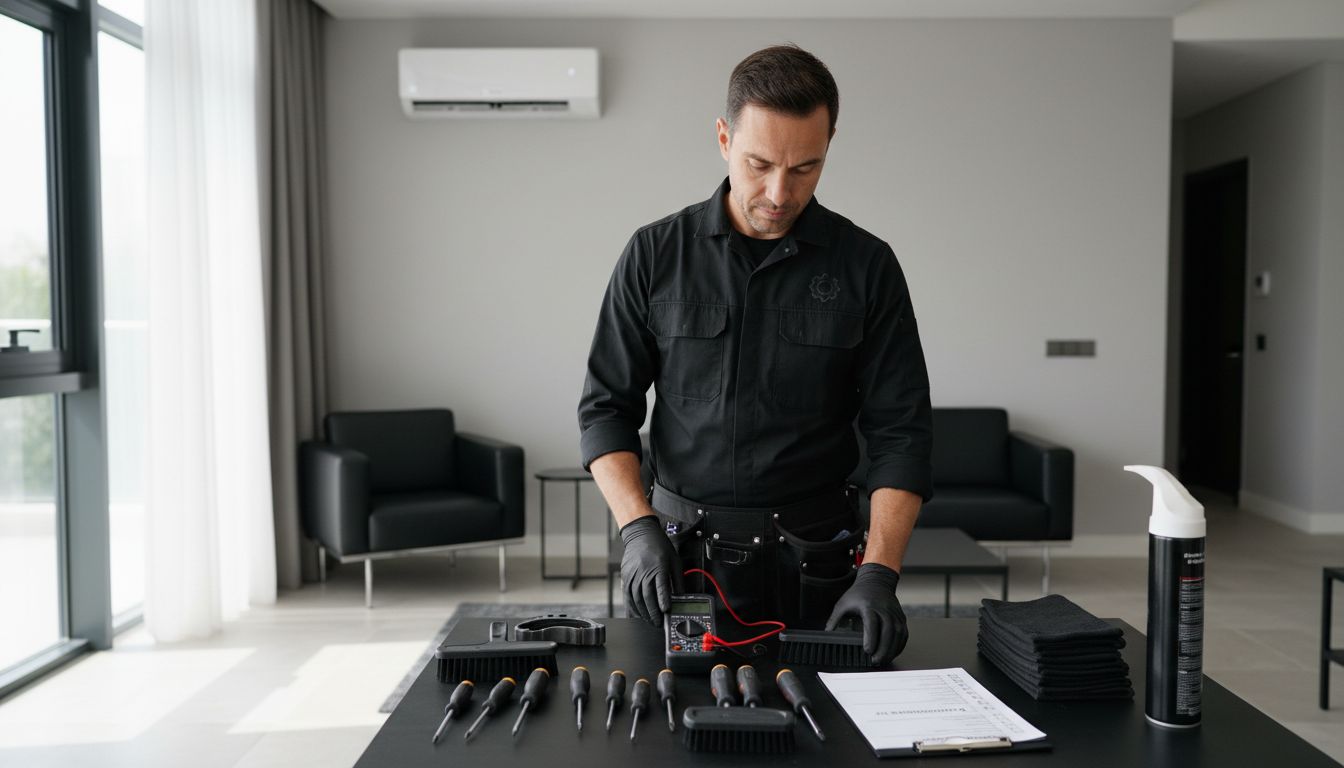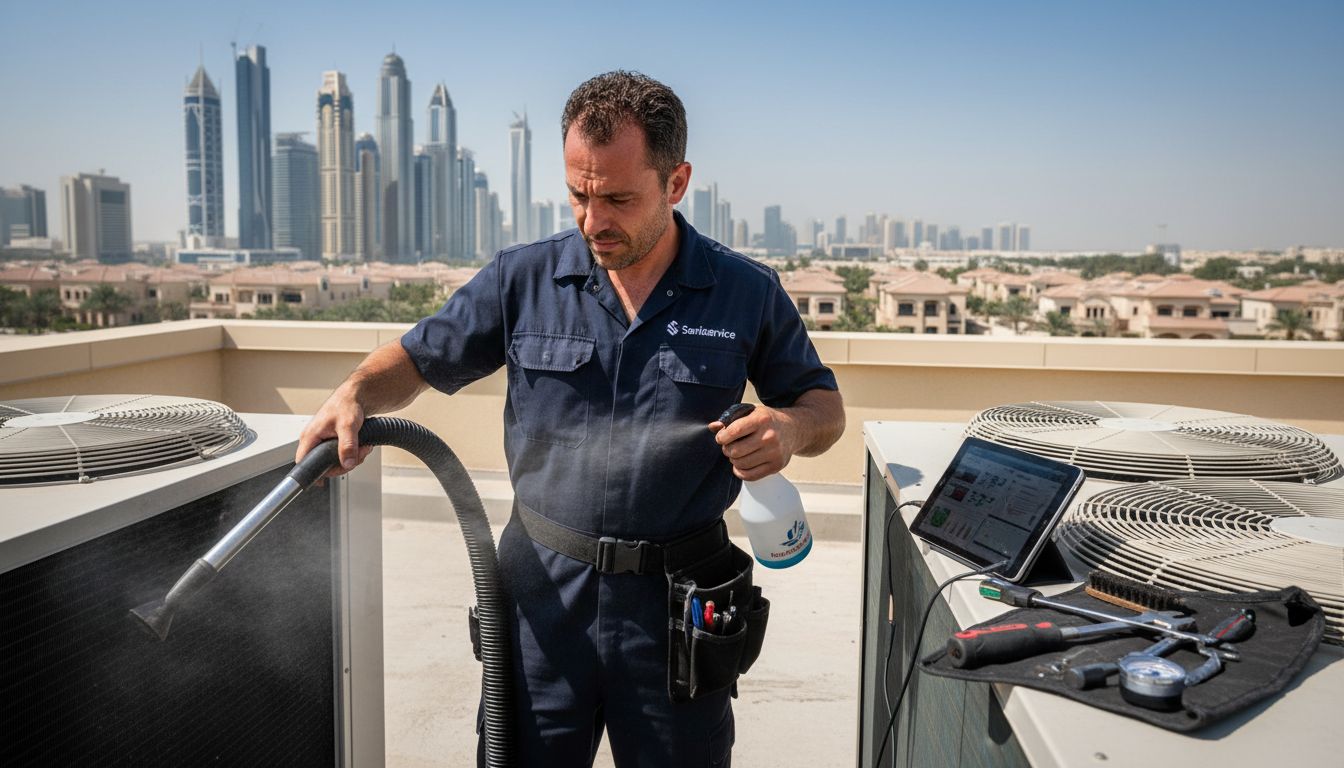
Complete Guide to Indoor Air Quality Standards UAE
More than 90 percent of people in the UAE spend their time indoors, where air quality directly shapes everyday health and comfort. In a country known for rapid urban growth and extreme weather, maintaining clean and safe indoor environments is more than a preference—it is a necessity. With rigorous standards now in place, understanding indoor air quality requirements in the UAE helps property owners and residents create healthier spaces while staying compliant and protected.
Table of Contents
Contents
- 1 Table of Contents
- 2 Key Takeaways
- 3 Defining Indoor Air Quality Standards UAE
- 4 Current UAE Regulations and Governing Bodies
- 5 Essential Parameters and Testing Methods
- 6 Compliance Obligations for Property Owners
- 7 Health Risks and Benefits of Adherence
- 8 Take Control of Your Indoor Air Quality Today
- 9 Frequently Asked Questions
- 10 Recommended
- Defining Indoor Air Quality Standards UAE
- Current UAE Regulations and Governing Bodies
- Essential Parameters and Testing Methods
- Compliance Obligations for Property Owners
- Health Risks and Benefits of Adherence
Key Takeaways
| Point | Details |
|---|---|
| IAQ Standards in UAE | The UAE aims for 90% indoor air quality by 2021, emphasizing health and sustainability in living environments. |
| Regulatory Bodies | Key organizations like MOCCAE and Dubai Municipality enforce strict standards and compliance for indoor air quality management. |
| Testing and Compliance | Property owners must conduct annual testing and adhere to environmental standards to maintain compliance and ensure occupant health. |
| Health Impact | Poor indoor air quality is linked to serious health risks, making adherence to standards crucial for public health and well-being. |
Defining Indoor Air Quality Standards UAE
The United Arab Emirates has emerged as a global leader in establishing comprehensive indoor air quality (IAQ) standards that prioritize human health and environmental sustainability. According to the Ministry of Climate Change and Environment, the nation’s ambitious National Vision 2021 agenda set a benchmark of raising indoor air quality to 90% by 2021, demonstrating a commitment to creating healthier living and working environments.
Indoor Air Quality (IAQ) represents the comprehensive assessment of environmental conditions within buildings, encompassing multiple critical parameters that directly impact human health and comfort. These parameters include:
- Concentration of airborne particulate matter
- Levels of volatile organic compounds (VOCs)
- Carbon dioxide and carbon monoxide concentrations
- Humidity and temperature ranges
- Presence of biological contaminants like mold and bacteria
In the UAE context, indoor air quality standards are particularly crucial due to the region’s unique environmental challenges. Extreme desert temperatures, high humidity levels, and rapid urban development create complex indoor environmental conditions that require sophisticated monitoring and management. SaniAC by Saniservice’s Indoor Air Quality Testing Process provides comprehensive insights into how professionals assess and improve these critical environmental parameters.
The UAE’s regulatory framework for indoor air quality integrates scientific precision with proactive health management. Government agencies like MOCCAE have established stringent guidelines that not only measure air quality but also mandate specific remediation strategies for residential, commercial, and industrial spaces. These standards reflect a holistic approach that considers both immediate health impacts and long-term environmental sustainability, positioning the UAE at the forefront of global indoor environmental health standards.
Current UAE Regulations and Governing Bodies
The United Arab Emirates has developed a robust regulatory framework for indoor air quality management, with multiple government entities playing critical roles in establishing and enforcing comprehensive environmental health standards. According to the Dubai Legislation Portal, Law No. (5) of 2025 specifically outlines the responsibilities of regulatory bodies in establishing precise environmental and health standards for built environments.
Key Governing Bodies responsible for indoor air quality regulation in the UAE include:
- Ministry of Climate Change and Environment (MOCCAE): Primary national-level environmental regulatory agency
- Environment Agency Abu Dhabi (EAD): Regional environmental protection and policy implementation
- Dubai Municipality: Local urban environmental standards and compliance
- Abu Dhabi Public Health Centre: Health-focused environmental monitoring
The UAE’s regulatory approach is particularly sophisticated in its comprehensive coverage. Why High Performers In UAE Audit Their Air Quality highlights how proactive these agencies are in establishing world-class environmental health protocols. The Environment Agency Abu Dhabi has been instrumental in this process, with Decree No. (2) of 2024 issued by Sheikh Hamdan bin Zayed Al Nahyan explicitly focusing on preserving environmental quality and improving ambient air standards.
These regulatory bodies collaborate to create a multi-tiered approach to indoor air quality management. Their strategies include developing comprehensive monitoring protocols, setting stringent emission standards, conducting regular environmental audits, and implementing progressive penalties for non-compliance. By integrating scientific research, technological innovation, and strict regulatory frameworks, the UAE has positioned itself as a global leader in creating healthier indoor environments that protect public health and promote sustainable urban development.
Essential Parameters and Testing Methods
Comprehensive indoor air quality assessment in the UAE involves a sophisticated array of scientific parameters and cutting-edge testing methodologies designed to ensure precise environmental monitoring. Dubai Municipality has been at the forefront of this technological advancement, with its mobile air quality monitoring vehicle receiving ISO 17025 certification, demonstrating the nation’s commitment to rigorous scientific standards.
Key Indoor Air Quality Parameters that professionals systematically measure include:
- Particulate Matter (PM2.5 and PM10): Microscopic solid and liquid particles suspended in air
- Volatile Organic Compounds (VOCs): Gaseous emissions from building materials and household products
- Carbon Dioxide and Carbon Monoxide: Indicators of ventilation efficiency and potential combustion sources
- Temperature and Relative Humidity: Critical factors affecting indoor comfort and potential microbial growth
- Biological Contaminants: Presence of mold spores, bacteria, and allergens
Testing methodologies have become increasingly sophisticated. Ajman Free Zone exemplifies this trend by implementing advanced airSense technology capable of measuring complex pollutants like O3, SO2, NO2, CO, and particulate matter with unprecedented precision. Modern testing approaches typically involve a combination of continuous monitoring systems, portable digital analyzers, and laboratory-grade sampling techniques.
Professional indoor air quality assessment in the UAE follows a comprehensive multi-stage process. Certified technicians utilize calibrated instruments to conduct detailed environmental scans, collecting air samples that are then analyzed using advanced spectroscopic and chromatographic techniques. These rigorous methodologies not only identify current air quality conditions but also provide predictive insights into potential environmental risks, enabling proactive management of indoor environmental health across residential, commercial, and industrial spaces.
Compliance Obligations for Property Owners
Property owners in the UAE face increasingly stringent regulatory requirements for maintaining indoor air quality standards. Dubai Legislation Portal highlights Article 33 of Law No. (5) of 2025, which explicitly mandates property owners to conduct comprehensive indoor air quality analyses and demonstrate ongoing compliance with environmental health standards.
Key Compliance Requirements for property owners include:
- Annual professional indoor air quality testing
- Maintenance of detailed environmental monitoring records
- Immediate remediation of identified air quality issues
- Installation of appropriate ventilation and filtration systems
- Regular HVAC system cleaning and maintenance
The Federal Authority for Identity, Citizenship, Customs & Port Security emphasizes that compliance is not merely a legal obligation but a critical responsibility for protecting occupant health. Non-compliance can result in significant penalties, including financial fines, potential legal action, and mandated property use restrictions.
Navigating these compliance obligations requires a proactive approach. Property owners must partner with certified indoor air quality professionals who understand local regulations and can provide comprehensive assessment and remediation services. This involves not just periodic testing, but developing a holistic strategy that addresses potential environmental risks, ensures system efficiency, and maintains a healthy indoor environment that meets the UAE’s rigorous environmental health standards.
Health Risks and Benefits of Adherence
The Ministry of Climate Change and Environment highlights the critical global health implications of air quality, revealing that air pollution contributes to 6.5 million deaths annually worldwide. In the UAE’s context, this statistic underscores the profound importance of rigorous indoor air quality management and its direct impact on human health and well-being.
Primary Health Risks associated with poor indoor air quality include:
- Respiratory Disorders: Increased risk of asthma, bronchitis, and chronic obstructive pulmonary disease
- Cardiovascular Complications: Heightened potential for heart disease and stroke
- Neurological Impacts: Potential cognitive decline and increased risk of neurodegenerative conditions
- Immune System Suppression: Reduced ability to fight infections and increased susceptibility to illnesses
- Allergic Reactions: Exacerbation of existing allergies and development of new sensitivities
SaniAC by Saniservice’s Indoor Air Quality Testing Process demonstrates that comprehensive adherence to air quality standards offers substantial benefits beyond mere regulatory compliance. Professionally managed indoor environments can significantly reduce health risks, improve occupant productivity, and create more comfortable living and working spaces.
The benefits of strict indoor air quality adherence extend far beyond immediate health protection. By implementing systematic monitoring, advanced filtration technologies, and regular maintenance, property owners can create environments that not only meet regulatory standards but actively promote occupant well-being. This proactive approach translates into reduced healthcare costs, increased property value, enhanced occupant satisfaction, and a demonstrable commitment to sustainable, health-conscious infrastructure management.
Take Control of Your Indoor Air Quality Today
Ensuring your indoor air meets the rigorous UAE standards is not just about compliance. It is about protecting your health from pollutants like mold spores, VOCs, and harmful particulates that can trigger respiratory and cardiovascular issues. If you want to create a safer environment for your family, employees, or customers, professional AC cleaning and maintenance is essential. By addressing the key factors highlighted in this guide, such as ventilation effectiveness and biological contaminant control, you can drastically improve comfort and reduce health risks.
Discover how Saniservice, Dubai’s pioneer in evidence-based air quality solutions, tackles these challenges with precise, chemical-free disinfection and deep cleaning of your HVAC systems. Our certified technicians dismantle and sanitize every component to eliminate allergens and bacteria that standard cleaning often misses. Visit our AC Cleaning & Maintenance – Saniservice AC Cleaning page to learn how our Swiss-quality process delivers healthier air and longer-lasting systems. See real-world success stories on our Case Studies – Saniservice AC Cleaning page. Don’t wait until poor indoor air quality compromises your well-being. Act now by exploring all our services at Saniservice and breathe easier with confidence.
Frequently Asked Questions
What are the key indoor air quality parameters that should be monitored?
Key parameters include particulate matter (PM2.5 and PM10), volatile organic compounds (VOCs), carbon dioxide and carbon monoxide levels, temperature and relative humidity, and biological contaminants such as mold and bacteria.
Why is indoor air quality important for health?
Indoor air quality is essential for health because poor air quality can lead to respiratory disorders, cardiovascular complications, cognitive decline, immune system suppression, and increased allergic reactions.
What compliance obligations do property owners have regarding indoor air quality?
Property owners are required to conduct annual indoor air quality testing, maintain environmental monitoring records, address air quality issues immediately, and ensure proper ventilation and filtration systems are installed and maintained.
How can property owners improve their indoor air quality?
Property owners can improve indoor air quality by implementing regular monitoring, using advanced filtration technologies, ensuring proper ventilation, maintaining HVAC systems, and taking immediate action to remediate identified air quality issues.
Recommended
- 5 Key Benefits of Certified Indoor Air Quality Testing Dubai for Health and Comfort – Saniservice AC Cleaning
- Why High Performers In UAE Audit Their Air Quality
- 10 Key Insights into the Indoor Air Quality Testing Process for Effective AC and Duct Maintenance in Dubai – Saniservice AC Cleaning
- 10 Must-Know FAQs About Improving Indoor Air Quality in Dubai – Saniservice AC Cleaning









Leave a Reply